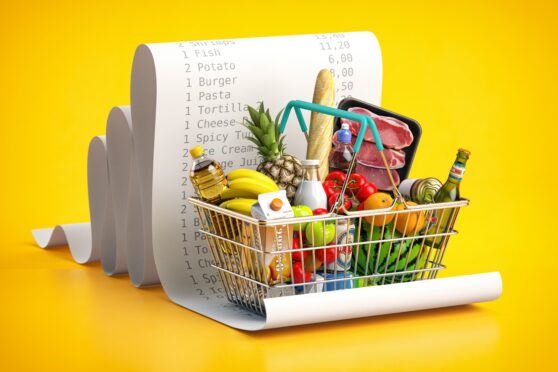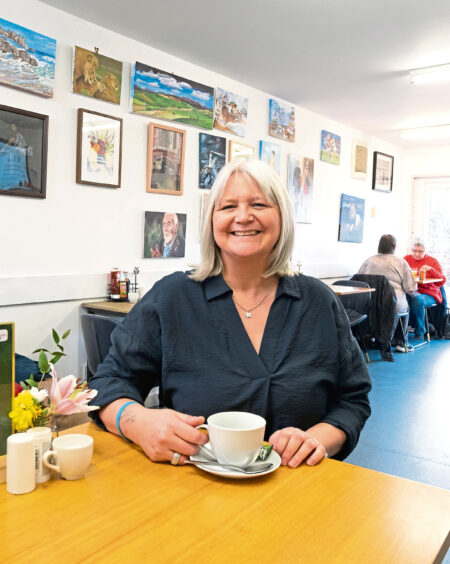
As thousands of Scots families struggle to put food on the table during the cost of living crisis, social supermarkets, where surplus stock from big retailers is discounted, are starting to pop up around the country.
The no-frills outlets provide food-insecure shoppers with a more dignified experience than foodbanks by charging a low price for mostly excess food sold in a supermarket setting, and then often providing further social support such as debt advice.
Customers can purchase fresh and frozen food and dried goods, as well as fruit and vegetables, with stock coming from mainstream supermarkets and local suppliers’ excess food.
Anyone can sign up to use social supermarkets as, unlike most foodbanks, a referral is not required to prove that you are struggling financially.
In the past two years, a small number of social supermarkets have started cropping up due to an increased demand for affordable food.
The S-Mart outlet in Forfar, Angus, and the Threehills community store at Nitshill in Glasgow are among the first of the trailblazing facilities with more expected to follow.
As well as helping people on low incomes access healthy meals, social supermarkets also reduce food waste by passing on goods that shops can no longer sell.
The Scottish Government has backed research into the idea to explore if it would support an expansion of cut-price stores in a number of our towns and cities.
But while anti-poverty and consumer advice agencies welcome the arrival of not-for-profit shops selling cheaper food, they say that schemes like this should not be necessary in modern-day Scotland.
How they work
Social supermarkets can appear in towns and cities in a number of different forms.
They often operate like any other mainstream store, where customers from any walk of life can simply pop in and buy surplus food at heavily discounted rates.
Other social supermarkets may run via a membership method for certain categories of workers or those on low incomes. NHS staff, police and other key workers, or people on low incomes, may be able to get a membership. This type of social supermarket works by charging a small, flat-rate membership fee. However, members can go into the supermarket and choose as much or as little food as they need. Another way social supermarkets work is via food packages, made up and available at weekly pop-up stores for a set fee. This fee will be very small, making the food very affordable.
Other stores offer schemes where customers can donate whatever they can afford, or pay a small set fee to then fill an empty bag with food.
Dr Faical Akaichi, a research fellow at the Scotland’s Rural College, has launched a study into social supermarkets north of the border.
He believes that if the right business model is adopted, it is a concept that could be here to stay.
“Social supermarkets firstly started in the United States and Europe as an alternative to foodbanks and they later emerged in England and Northern Ireland but this is a fairly new idea to Scotland,” he explained.
“One of the main differences from foodbanks is that customers get to choose their own goods rather than the contents of a bag or basket of food being chosen for them.
“The college was asked by the Scottish Government to explore if there was a business model that could be applied across the board that also involved these stores having some form of social support such as debt advice or cooking lessons attached to them, then it might consider supporting such a scheme.
“At the moment, the social supermarkets tend to either sell goods at a heavily reduced price, ask people to pay a set price for an empty bag that they can then fill with whatever they choose, or some stores simply ask people to donate whatever they can afford for the food.
“Maintaining the dignity of customers is also of high importance as a lot of people on low incomes don’t want food for free but don’t mind buying it from a cut-price store, knowing that the money is being reinvested back into the business.
“The goods tend to come from mainstream companies such as Tesco and Morrisons or is surplus from local suppliers. This includes well-known food brands that perhaps have some damage to the packaging or are approaching their sell-by date. Perception plays an important role in this. When no-frills supermarkets like Lidl and Aldi first arrived in Britain from Europe they were viewed with suspicion but now they are two of the fastest-growing chains in the country. People want value for money, especially in the current economic climate.”
Akaichi continued: “The main challenge to social supermarkets is securing enough supplies on a daily basis but we expect their popularity will only continue to grow as the cost of living crisis rolls on.”
The Sunday Post approached Tesco, Sainsbury’s and Morrisons for their opinions on the rise of social supermarkets but only Morrisons responded – and only to confirm that the company does donate excess goods to these social enterprises.
Morrisons said: “For local foodbanks or community and social supermarkets, our community champions at each store are able to provide surplus food if available.”
To tackle soaring supermarket prices, the UK Government last week revealed plans to introduce a cap on the price of basic items – but this will not help tackle the rising cost of living, retailers have warned.
The British Retail Consortium said the measures would not make a “jot of difference” and could even thwart efforts to cut inflation.
A voluntary agreement with major retailers could see price reductions on basic food items like bread and milk but there are no plans for a mandatory price cap, No 10 sources have stressed.
Consumer agencies and social charities said that while there was a pressing need for affordable food, they had concerns that a surge in social supermarkets could create a dependency that should not be required in an affluent country like Scotland.
Citizens Advice Scotland’s social justice spokesman David Hilferty said, however, that anything that increased consumer choice and made life easier for people to shop in the current food price crisis was something it would support.
“There’s no doubt that many households are struggling to get by at the moment, and finding it hard to put food on the table,” he said.
“Last year we provided 73,181 pieces of advice on food insecurity, compared to 57,513 the previous year. It’s clear that people need all the help they can get.
“So, we welcome social supermarkets in that context, but really the governments need to recognise that they must provide more support to people who need it until the cost of living crisis is over.”
Ruth Boyle of the Poverty Alliance said the rising tide of financial hardship was leaving more and more people unable to access the basic food they needed for their households.
“Many of our members have turned compassion into action by running community pantries or social supermarkets in their areas,” she said.
“They have become an important source of affordable food that people can access on their own terms, and with a sense of dignity and self-worth.
“There may be more of these projects now because of the costs crisis and the rocketing price of groceries, but they shouldn’t be necessary in a wealthy country like Scotland.
“Our politicians can act to make sure that every household has the incomes they need to buy essentials in the same way as their neighbours.”
The social supermarkets themselves expect business to explode across the country in the coming years.
Pauline Lockhart, founder of the S-Mart store in Forfar, plans to open outlets in Brechin and Arbroath later this year before targeting larger urban areas.
She said: “Since opening in 2020 we have saved 300 tons of food from going to landfill, which equates to 730,000 meals and because everything we sell can be up to half the price of regular supermarkets, our members individually have saved over £1,800 each per year, money that can be directed elsewhere such as their heating, electricity and gas bills.
“Our model works for the community, the economy and the environment and because we are a social enterprise, all our profits go back into our organisation to help us do more good work in our community such as providing jobs, work experience, volunteering opportunities and training.
“We hope to eventually open in large cities such as Glasgow, Edinburgh, Aberdeen and Dundee to support communities in those areas.”

Enjoy the convenience of having The Sunday Post delivered as a digital ePaper straight to your smartphone, tablet or computer.
Subscribe for only £5.49 a month and enjoy all the benefits of the printed paper as a digital replica.
Subscribe © Paul Reid
© Paul Reid